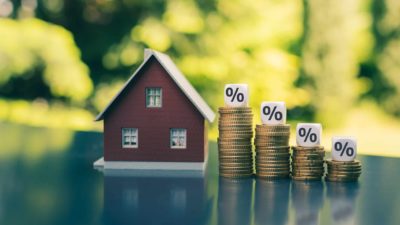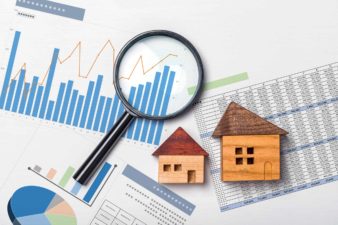The housing market has been through a rough patch but signs of life are emerging. Beneficiaries of a recovery go beyond homeowners and include realtors, advertisers, and mortgage brokers. Industries adjacent to the property market are hoping for a return to normal trading conditions sooner rather than later.
Australia's housing market is showing clear signs of recovery in the capital cities with the Sydney Morning Herald reporting that house prices in Melbourne are rising by $2,500 a week and prices in Sydney are increasing by $3,000 a week. Spring is in the air, which means more houses are going to market, and it seems buyers that have been starved of choice over the past couple of years have returned to the market in force.
Between 1993 and 2018 house prices rose on average 6.8% per annum. Now that interest rates are at record lows, and with the populations of Melbourne and Sydney in particular continuing to grow, it looks like house price are on track for a recovery. Wage growth and a reduction in unemployment will assist in sustaining the recovery and ensuring it takes hold outside the capitals.
The decline in the housing market didn't just hurt homeowners; realtors, real estate sites, builders, materials suppliers, mortgage brokers and others all suffered when the housing market faltered. Now that there are signs of life, adjacent industries will also be picking up steam. We take a look at some of the sectors and companies set to benefit from the recovery in housing prices.
Mortgage broking
Australian Finance Group Ltd (ASX: AFG) is one of Australia's largest mortgage broking groups. Settling over $31 billion in loans in FY19, AFG has nearly 3,000 brokers under its banner. The combination of the property market recovery and record low interest rates should benefit AFG as additional home buyers enter the market and require assistance organising a suitable mortgage.
The AFG share price fell to a low of 90 cents in February on fears commissions would be banned in the wake of the final report of the Royal Commission. Having since recovered to around $2.57, AFG recently announced a proposed $120 million merger with rival mortgage aggregator Connective. The merger, which will require the approval of the ACCC, would create a mortgage broking behemoth with a combined 6500 brokers and FY19 settlements of $76 billion.
Under the terms of the deal, Connective shareholders would receive $60 million in cash and 30.9 million AFG shares. The debt portion of the deal is being financed via a facility with a major Australian bank at an annual interest rate equivalent to BBSY plus 3.65%. Half the debt is to amortised over the 5-year term with a bullet payment at the end of the 5 years.
AFG reported a challenging FY19 with residential settlements down 11.5% compared to the prior year. Revenue from continuing operations was up 6.6% $660 million, however net profit after tax was 0.8% below FY18 at $33 million. Increases in the loan lives and size of the the loan and trail books were offset by decreased residential and commercial settlements.
AFG's September Quarter Index reported loan volumes up 21% on the previous quarter and 11% on the same quarter last year. A shift away from the major banks was reported with non-majors accounting for 46% of market share, the highest level since the GFC.
Real estate advertising
REA Group Limited (ASX: REA) is a real estate advertisement company with sites in Australia, Malaysia, Indonesia, Hong Kong, Thailand, Singapore, and China. It also holds shares in companies that operate real estate sites in the United States and India. REA has a home loan offering in partnership with National Australia Bank Ltd. (ASX: NAB), and in July completed the acquisition of the remaining stake in Smartline, a mortgage broking group.
REA Group stands to benefit directly as the housing market recovery gathers pace. Increased property listings on its Australian advertising platform and increased loan applications through the Smartline business should be expected. REA's share price has increased 47% this year to around $110.39 from $74.26 as signs of improvement became clear.
REA Group faced a difficult FY19 in which listing numbers decreased significantly as the property market faced powerful headwinds. Nonetheless, REA Group grew revenue by 8% to $874.9 million in FY19, with earnings before interest, tax, depreciation and amortisation (EBITDA) also up 8% to $501.2 million. The bulk of REA Group's revenue is derived from its Australian operations, which were up 8% in FY19 to $826.3 million.
The realestate.com.au site was visited 76.8 million times per month while the app was launched 29.4 million times per month. Revenue from residential listings was up 8% to $555 million, while commercial and developer revenue was up 6%. Net profit increased by 6% to $295.5 million and earnings per share were up 6% to $2.24 per share.
REA Group paid a full year dividend of $1.18 per share was paid, fully franked, which represents an 8% increase on the previous year. The dividend yield on REA shares is currently ~1.06% and shares a trading on a price-to-earnings ratio of ~140.
Domain Holding Australia Ltd (ASX: DHG) is REA Group's direct competitor in the real estate advertising space. Domain offers property marketing platforms for residential, new development, and commercial properties. Domain also offers a home loan finder service in partnership with Lendi. Domain shares are up 45% this year to around $3.22 from $2.22 in January on hopes of a property market recovery.
FY19 was a challenging year for Domain in the context of the struggling Australian property market. Residential listing volumes were significantly lower; however, Domain was able to lift residential yield by 12%. Commercial revenues grew by 30%; however, revenue in the print division slid 30%, reflecting weakness in the residential market, particularly in Sydney and Melbourne.
Overall, there was a 6% slide in revenue to $335.6 million, down from $357.3 million in FY18. Expenses were marginally lower, $237.3 million in FY19 to $240.2 million in FY18. EBITDA declined 15.3% to $98 million from $115.7 million in FY18.
Earnings per share were 6.43 cents compared to 9.17 cents the previous year. Domain paid a dividend of 4 cents per share, fully franked. The dividend yield on Domain shares is currently ~1.84%.
Foolish takeaway
Australians love their houses and have a national fixation with the property market. Despite this it can be easy to forget how widespread the influence of the housing market is. From small businesses to large ASX-listed companies, the real estate sector doesn't just impact homeowners. Investors can seek indirect exposure to the housing market through shares that are leveraged to it.






